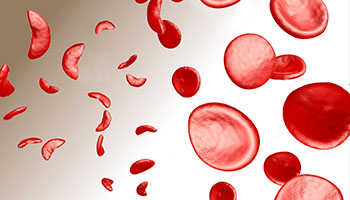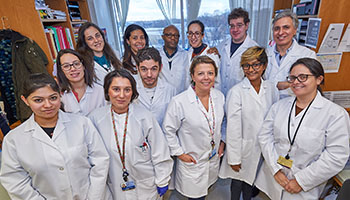HOW CAN WE HELP YOU? Call 1-800-TRY-CHOP
In This Section
Will a New Vector Offer Safer Gene Therapy for Red Blood Disorders?

In a preclinical study of a gene therapy vector developed by CHOP researchers, results show potential of a safer, more effective treatment for sickle cell disease and beta-thalassemia.
mccannn [at] chop.edu (By Nancy McCann)
The findings:
Researchers in the Comprehensive Center for the Cure of Sickle Cell Disease and Other Red Blood Cell Disorders (CuRED) at Children’s Hospital of Philadelphia have developed a potentially safer and more effective gene therapy vector for blood disorders, such as sickle cell anemia and beta-thalassemia, than the vectors that are currently used in gene therapy trials for these conditions.
Why it matters:
Sickle cell disease (SCD) and beta-thalassemia represent the most common hemoglobinopathies caused by deficient production or alteration in the genes for hemoglobin, a protein consisting of globin and iron-containing subunits found in red blood cells that deliver oxygen throughout our bodies. Patients with these devastating blood disorders experience serious health complications such as anemia, episodes of severe chronic pain, stroke, and premature death.
The results from this preclinical study showed that a lentiviral vector — an engineered vehicle for delivering functional copies of the beta globin gene to correct the genetic abnormality — led to the expression of higher levels of hemoglobin with a lower dose than current therapy, minimizing the risk of toxic side effects. For those who suffer from these painful blood disorders, the possibility of this new treatment could be life-changing — and lifesaving.

Researchers in the CuRED Frontier Program have developed a potentially safer and more effective gene therapy vector for blood disorders, than the vectors that are currently used in gene therapy trials for these conditions.
Who conducted the study:
Stefano Rivella, PhD, the Kwame Ohene-Frempong endowed chair in Pediatric Hematology and director of CuRED was senior author. Laura Breda, PhD, research assistant professor with the Division of Hematology at CHOP was first author of the paper. Researchers from the University of Pennsylvania also contributed to the study.
How they did it:
By using a variety of screening methods in human cells and working with mouse models to test several novel vectors, the research team found one of the vectors they created, ALS20, expressed significantly higher transgenic hemoglobin levels than other vectors currently used to treat beta-globinopathies. Compared with three benchmark vectors already in use in clinical trials, ALS20 produced from 40 percent to 157 percent more adult hemoglobin, which would have a greater clinical impact on patients, especially those who require higher hemoglobin production to become independent of transfusions. ALS20 also was more powerful — lower dose provided higher hemoglobin production — which could reduce the need for myeloablation, a procedure in which the bone marrow is suppressed via chemotherapy or radiation before gene therapy can begin.
Quick thoughts:
“These results have many potential benefits for the successful treatment of patients affected by beta-globinopathies like sickle cell disease and beta-thalassemia, including a better dose response, a minimized chance of developing malignancies, a reduced cost of therapy, and a potentially reduced need for chemotherapy or radiation before beginning gene therapy,” Dr. Breda said. “All of us in the CuRED Frontier Program at CHOP are dedicated to finding new and improved curative therapies for blood disorders, and we look forward to taking steps to move this vector into clinical trials.”
Dr. Rivella added that data indicate this vector has a higher chance to cure the patients. “We want to have an ethical approach to be sure that the vector that we’re proposing has a good chance to be better than whatever has been utilized already for the patients,” he said.
What’s next:
Once the U.S. Food and Drug Administration approves ALS20, the study team plans to move forward with a clinical trial.
Where the study was published:
The study appeared in Molecular Therapy.
Want to learn more?
Learn more from this CHOP press release, read about Dr. Rivella and his research in this Cornerstone profile.


